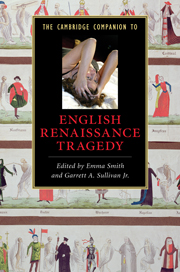Book contents
- Frontmatter
- Part 1 Themes
- 1 English Renaissance tragedy: theories and antecedents
- 2 Tragedy, family and household
- 3 Tragedy and the nation state
- 4 Tragedy and religion
- 5 Tragedy and revenge
- 6 Tragic subjectivities
- 7 Tragic forms
- 8 Tragedy and performance
- 9 Renaissance tragedy on film: defying mainstream Shakespeare
- 10 Shakespeare and early modern tragedy
- Part II Readings
- Index
10 - Shakespeare and early modern tragedy
from Part 1 - Themes
Published online by Cambridge University Press: 28 November 2010
- Frontmatter
- Part 1 Themes
- 1 English Renaissance tragedy: theories and antecedents
- 2 Tragedy, family and household
- 3 Tragedy and the nation state
- 4 Tragedy and religion
- 5 Tragedy and revenge
- 6 Tragic subjectivities
- 7 Tragic forms
- 8 Tragedy and performance
- 9 Renaissance tragedy on film: defying mainstream Shakespeare
- 10 Shakespeare and early modern tragedy
- Part II Readings
- Index
Summary
In a companion to early modern English tragedy, Shakespeare is the elephant in the room. Aren't these other writers ultimately also-rans, the not-Shakespeares: Salieris in the age of Mozart, daubers in the shadow of Leonardo? Everything in our institutional culture, from course syllabi to theatre scheduling to politicians' rhetoric, is invested in Shakespeare's superiority to and separation from other writers of his own time and since, and thus implicitly in the corresponding derogation of these other writers. Most readers, students or theatregoers who encounter other early modern plays will have encountered Shakespeare first, and thus measure them by their distance from the familiar. Other Renaissance dramatists thereby become either 'non-Shakespearean' or 'Shakespeare's contemporaries', with distinctly evaluative implications. A newspaper review of a rare revival of Kyd's The Spanish Tragedy is prefixed with just such a popular judgment: Shakespeare's 'characters are so complex and blessed with such gifts of the gab, that the characters dreamt up by his lesser contemporaries seem at best three-quarters baked'.
That Shakespeare is seen to overshadow other early modern playwrights is common enough. In Harold Bloom's influential study of poetic influence, Shakespeare is explicitly excluded from the Oedipal lineage of poetic fathers and sons, because he alone has as a precursor, Marlowe, 'a poet very much smaller than his inheritor'.
- Type
- Chapter
- Information
- The Cambridge Companion to English Renaissance Tragedy , pp. 132 - 150Publisher: Cambridge University PressPrint publication year: 2010

